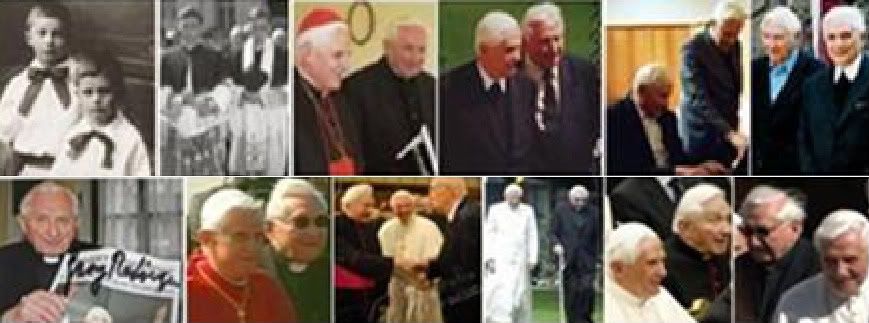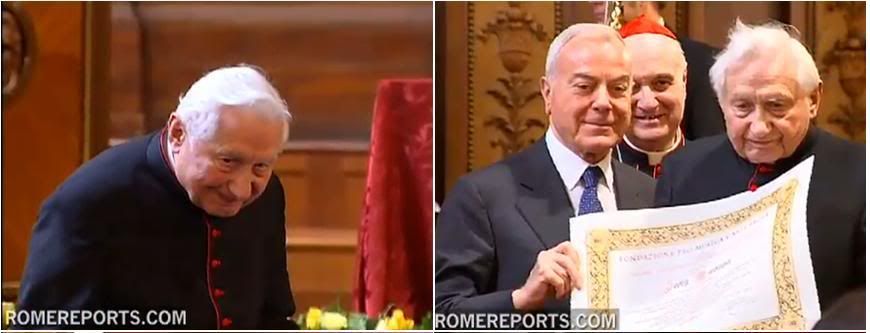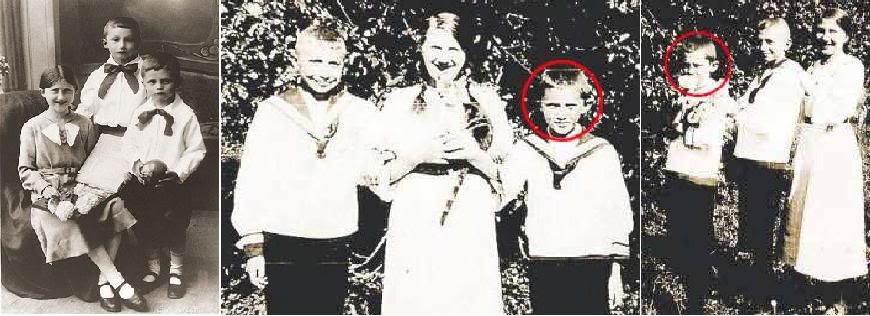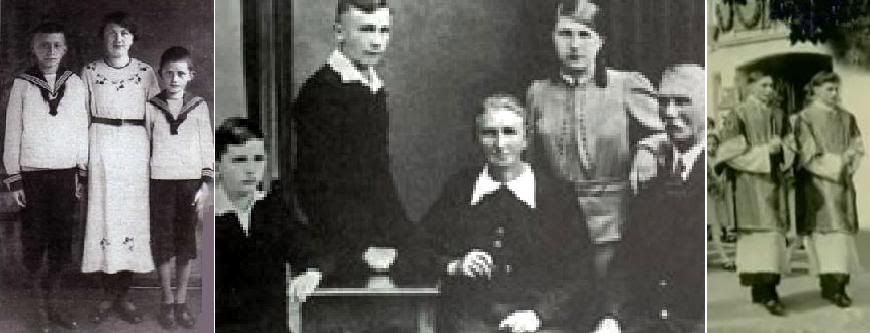 On her blog today, Angela Ambrogetti has a story about Mons. Georg Ratzinger which contains some material I have not seen before. Some of it was published when the Pope's brother received a Musica Sacra award last October in Rome, but there is a lengthy interview from INSIDE THE VATICAN magazine, whose original I cannot find online. (Unfortunately, for some time now, ITV has stopped publishing its monthly news flashes and even its publisher-editor's blog 'The Moynihan Report', cannot now be found online - I think he has completely converted it to a newsletter feed - and he has also not filed anything for ZENIT in several months)... Anyway, problematic sources notwithstanding, the GR interview from Ambrogetti deserves translating back to English....
Georg Ratzinger:
On her blog today, Angela Ambrogetti has a story about Mons. Georg Ratzinger which contains some material I have not seen before. Some of it was published when the Pope's brother received a Musica Sacra award last October in Rome, but there is a lengthy interview from INSIDE THE VATICAN magazine, whose original I cannot find online. (Unfortunately, for some time now, ITV has stopped publishing its monthly news flashes and even its publisher-editor's blog 'The Moynihan Report', cannot now be found online - I think he has completely converted it to a newsletter feed - and he has also not filed anything for ZENIT in several months)... Anyway, problematic sources notwithstanding, the GR interview from Ambrogetti deserves translating back to English....
Georg Ratzinger:
'Home is where my brother is'
Translated from

February 12, 2011
Even today, Musica Sacra is a way to approach music in general, according to Mons. Georg Ratzinger, the Pope's brother, who was Domkapellmeister of Regensburg Cathedral and music director of the Regensburg Boys Choir for three decades.

Last October 25, he was given an award by the Rome-based Fondazione pro musica ed arte sacra, which sponsors the annual International Festival of Sacred Art and Music, dedicated in 2010 to Benedict XVI to mark the fifth year of his Pontificate.
Since his brother became Pope, Mons. Georg has visited Rome regularly, and describes his arrivals in Rome: "It is always a moment that is both festive and solemn when I get off the airplane...Then, at the Vatican, there is always this joyful welcome from the Memores, the secretaries, Suor Christine
[the nun who acts as his nurse companion whenever he is in Italy] ... Then I go to visit my brother in his rooms. It is our first meeting for the occasion, and for me it is like coming home....Home is wherever I meet my brother, no matter where. And I also feel that his pontifical family has also become my family... Every morning, my first thought is for him, that he may have the health and the strength that he needs to carry out his mission".
Last week, Mons Georg
[he turned 87 last January 15 - he usually arrives in Rome a few days before the New Year and stays to spend his birthday with the Pope before returning to Regensburg] had knee surgery in a Regensburg hospital and is now carrying out rehabilitation therapy, hoping to be able to visit his brother as soon as possible.
The bond between the brothers is deep and strong, as the older brother recounts to
Inside the Vatican magazine in a face-to-face interview:
What is your first memory of your brother?
That's difficult to answer. I remember very little of his birth because I was very young
[he would have been 3!][, nor was I present for his baptism because he was baptized right away, and we older siblings did not go because it was such a cold day.
Then suddenly there was this little baby in our daily life, and I really did not know what to do with such a small baby. Later, when we were a little older, we two brothers played a lot together and did so many things together. Initially, I was more with my sister because we were older, but in time, this intense relation with my younger brother developed. we would build the Christmas creche together, and we frequently had these spiritual games, which we called 'playing at being parish priest'. Our sister did not take part. We would play at saying Mass, and we wore chasubles which our mother had the dressmaker make for us. We took turns being celebrant and acolyte.
 Above, panel in the room devoted to Joseph's early years in the Marktl birth-house museum; right, set of cruets that the brothers used when they played Mass.
Above, panel in the room devoted to Joseph's early years in the Marktl birth-house museum; right, set of cruets that the brothers used when they played Mass.


Then the seminary, our passion for liturgy and music and study... It was a continuous development. Even as children, we lived with this love of liturgy, which developed in the seminary, along with sacred music. Everything came together...
In those early years, were you concerned or did you hope that your younger brother would follow your example?
There was no reason for concern. I was always interested in whatever he did, but calmly.
What happened after you were both ordained and said your first Mass?
We were separated for three years before that, because in 1947, Joseph went to Munich for his studies, and we came back together in Freising in 1950 (one year before their ordination).
Following our ordination, we were assigned to neighboring parishes in Munich from November 1951 to October 1952. Our parishes were separated only by a park - I was at the church of St. Ludwig, and Joseph at the Church of the Most Precious Blood.
Then, he accepted to become a professor, partly because this was helpful to the family. In 1955, our parents went to live with him in Freising, and in 1956, our sister, too, so whenever I had free time, I visited the family in Freising. He became the reference point for the family, and that was convenient for all of us.
And when he became a bishop and cardinal?
Before that, we were all separated when Joseph went to Bonn, then Munster and Tuebingen. Eventually, we all ended up together again in Regensburg, with me at the Cathedral, and Joseph at the University.
[By this time, both parents had died - in the early 60s, when Joseph was teaching in Bonn].
It was a very beautiful time, when all three of us were together. Then, he was named archbishop and he transferred to Munich, but the distance was not so far. However, it was lack of time that kept us apart because of his duties.
And his transfer to Rome?
In effect, I felt it as quite a loss when he moved to Rome
[with their sister] because I knew that his responsibilities would mean we would have less contact. So three times a year I went to Rome. And then in the summer and at Christmastime, they would come to Regensburg. It meant a lot to him to be able to come home to his own house in Pentling. We made it a point to see each other at other times, like at Ascension (after Pentecost), when he came home for a spiritual retreat in some convent, and in the summer, when we would take vacations together - in Bad Hofgastein (Austria), in Bressanone, in Linz.
What do you remember best about those times when you were mostly apart?
The most beautiful moment was always when he arrived from Rome. Mr Kuehnel would pick him up from the airport in Munich [and dricve him to Regensburg], and when I was still choirmaster, he would arrive to a festive dinner. This marked the start of 'vacation' and it was wonderful. Later, after I retired, we would have this dinner in my home in Lutzgasse. It was a real rite of homecoming, even if this time, there was no performing choir. It was always a dinner with all the things he likes best to eat.
And now, how does the Pope welcome you to Rome? is there a similar 'rite'?
It is always a moment that is both festive and solemn from the time I get off the plane. They come to fetch me with a car that drives up to the airplane ramp, with a police escort. Everyone is very kind, and I can proceed directly to the Vatican. I think of all the trouble for those who have to leave the airport by public transport, and here I am, being received almost ceremonially.
Then there is always this joyous welcome from the Memores, the secretaries, Suor Christine, who make my arrival at the Vatican a beautiful experience. I proceed to visit my brother in his rooms. That is our first encounter for the occasion, and for me, it is like coming home. It is a familial situation with the Memores and the others, when we sit down to exchange news and chat.
For me, home is where my brother is, wherever that may be. And I feel that the pontifical family has also become my family.
Do you talk about the past?
With Maria, we were always a trio. Now we are incomplete. When she was with us, her presence itself was a reminder of our parents. Now that she is no longer with us, remembering her, we remember our parents.
Tell us how you learned your brother had been elected Pope...
During the Conclave, I never once thought that he could become Pope! I was convinced it was not even possible because he was already too old. I was thinking of Pope John XXIII who was one year younger when he was elected, at a time when the college of cardinals was not so large because Pius XII had not created many cardinals, so there was a limited choice. But 2005 was completely different, so I never expected anything of the sort!
And when the announcement came, my first reaction was sadness, because I realized that as Pope, his personal and private life would be taken away.
What I did not realize was that I could maintain a very personal relationship with my brother even if he was Pope, and that I could meet him as often as I do now, with all the privileges that I am given coming and going. Everything has been made convenient for me to meet my brother whenever.
When you speak of Bavaria, is there a nostalgia for his homeland?
It's not really nostalgia. One grows, and one matures. Of course, he is interested about Regensburg, our neighbors, all his friends and acquaintances from earlier days, etc. He is always interested about them.
Many of us are curious: Does the Pope still have cats?
Yes. We both love cats. When we lived in Hufschlag (outside Traunstein), we each had our own cats, as well as those who came to the garden. We love cats, but now, the only cats are in Pentling.
[So there are Ratzinger cats other than Chico who belongs to the neighbors?]
What do you think about most often for your brother?
Every day I pray that he may have the health and the strength that he needs in order to carry out his mission.
About music, do you still play music together?
Not together, because I can no longer read sheet music and can only play music that I know by memory....We played four hands when we were younger but not very much.
How is the Pope as a pianist?
He certainly had much talent but he did not develop it because he dedicated more time to his books. Also whenever I played, it inhibited him from playing.
Ultimately, one always ends up talking music with Mons. Ratzinger, and of music education - he believes that today, sacred music has not just artistic value but also didactic value, for music appreciation.
"Certainly it is still important to speak about sacred music today," he said last October. "For those who live in the countryside, it is often their first contact with music other than pop or folk. For many, their musical knowledge begins with sacred music".
He believes that those who perform and promote sacred music have a duty to make others discover the very sense of music itself. In addition, he says, "sacred music makes liturgy more communicative, more beautiful, more joyous, and is thus very important in the liturgy".
He loves to bring up the example of the Viennese bass Walter Berry, one of the great basses of the 20th century, "whose wonderful voice was discovered when he was singing for his parish choir".
Despite his 87 years and near-blindness, Georg Ratzinger preserves the fresh enthusiasm of youth when he speaks of music.